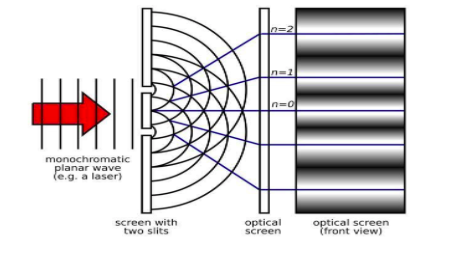Question
Question: In YDSE the intensity of the central bright fringe is \[8m\dfrac{W}{{{m^2}}}\]. What will be the int...
In YDSE the intensity of the central bright fringe is 8mm2W. What will be the intensity at 6λ path difference?
A) 8mm2W
B) 6mm2W
C) 4mm2W
D) 2mm2W
Solution
Hint- YDSE is Young’s Double Slit Experiment. YDSE is performed with a monochromatic light source. Coherent source of light: Two sources of light are said to be a coherent source if the phase difference between them is constant and the same frequency.
Complete step by step answer:
Given details:
The intensity of central bright fringe, I0=8mm2W,
Path difference,x=6λ
Formula used:I = I0cos2(2θ),
where I= Intensity of the light wave, I∘=Intensity of the central fringe,
θ=Phase difference=λ2πx Path difference

Monochromatic source of light:
The light having the same wavelength is called monochromatic light.
Interference of light:
When two monochromatic light waves are superimposed on each other, the intensity in the region of superposition gets redistributed, becoming maximum at some points and minimum at others.
In an interference pattern, the intensities at the points of maxima and minima are directly proportional to the square of the amplitude of the waves. If there is no interference between the light waves from the two sources, then the intensity at every point will be the same and there will be no formation of fringes.
Therefore, we can calculate the value of phase difference.
The phase difference is given by
θ=λ2πx Path difference
→θ=λ2πx6λ
→3π
Now, we will calculate the intensity at a path difference (6λ) by using the given values in the question, I = I0cos2(2θ)
→8cos2(2x3π)
→8cos2(6π)
→8(23)2
→8(43)
∴6mm2W
The correct option is (B).
Note: 1. The intensity of light produced by Young’s Double Slit Experiment is calculated as I = I1+I2 + 2I1I2cosθ
2. Bright fringes or constructive interference are produced when the value of cosθ = 1, θ = 0, 2π,4π,............
3. Dark fringes or destructive interference are produced when the value of cosθ = - 1, θ = π, 3π, 5π,..............
4. According to Huygens’ principle a cylindrical wavefront emerges from a point source, in Young’s Double Slit Experiment point source is used so the wavefronts are cylindrical wavefront.
